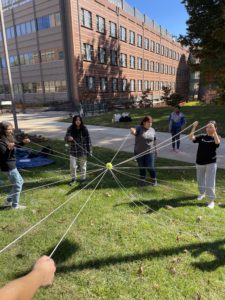The EDGE Challenge Course offers a variety of Experience-Based Learning activities for organized groups to improve important life skills, interpersonal relationships, and teamwork. Depending on the focus of your group, as well as the desired outcome from your time with us, will help us chose the best program to fit your needs. Read more about the specialized programs we offer below, or contact us directly and we can tailor a program to suit your needs.
Experiential Education
In ALL our program options, we focus on creating an environment where learning can best occur, we create team-building experiences through experiential education, and we utilize Action Learning cycle. The Action Learning Cycle is a four-step model:
Activity—We set up an activity for a group that creates a micro-experience of group dynamics. Most activities require the team to reach a goal, solve a problem, or finish a project. However, learning may occur even if they don’t complete the task.
Reflection—Following each activity, an EDGE facilitator will guide the team in a discussion about what happened during the activity allowing the team to learn how to talk about how they work and build awareness for potential group challenges.
Analysis—Once the group has discussed what happened during the previous activity, they can analyze how the challenges that arose during the activity may apply to their work environment. Analysis may come from models the facilitator introduces, previous experiences team members have had, and from articles, theories, and other writings.
Ideas—Once the team has a good understanding of the activity’s outcome, they can begin to develop ideas for handling future activities and even upcoming projects.
Using this complete model, teams learn to understand how they can avoid issues such as analysis paralysis and crisis management and begin to increase their effectiveness. They also learn to recognize strengths and to capitalize on differences.
With each activity, the challenge increases, forcing the team to hone its communication, goal setting, planning, and implementation skills. Additionally, elements such as trust and leadership are essential for the group to be successful in their activities. The activity brings team work issues to the forefront, the team is given the opportunity to reflect on the activity, the issues they encountered, and then think about how future activity processes can be improved through a facilitated debrief following each activity.
As the program progresses, the team’s learning builds. What might have been challenges at the beginning of the day have been conquered. By the end of the day, the participants have been exposed to a new level of team awareness, and have been introduced to new skills and techniques for dealing with bigger, more complex issues. Perhaps most importantly, the team has been given a new language for talking about the challenges they face individually and as a unit.
Many times, groups come to The EDGE with unique circumstances. With this information, the facilitators lead the team through specific activities that will encourage the team to confront the challenges they face. The result is new awareness for the challenges and skills that will carry back to the workplace.
Why It Works
In the last 30 years, a great deal of research has been done on learning. The research results all indicate that people learn best when they actively experience a concept or idea. These active learning experiences create the highest percentage of not only memorization or recall of concepts but actually transferrable skills implemented in different contexts. Research also indicates that when learning is fun, recall will be much greater. The organic experience of learning as a team in a fun, casual atmosphere creates a common language to discuss other challenges that may emerge as the team matures and changes.
Ready to Schedule? Complete an Information Request Form.
If you have more questions, contact us at edge@gmu.edu or (703) 993-4313.
